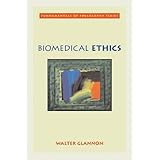
Average Reviews:

(More customer reviews)I had my own rather nasty tangle with the margins of biomedical ethics last year. As a result, a lot of my online reading has been spent diving deeper in some of the ethical issues around medical research, pregnancy, premature babies, and intervention guidelines. I decided to pick this book up to try to give myself some background to the debate, so that I feel like I can be a more educated participant. That makes me a rather odd reader of this book, I suspect. It seems obvious that it was intended as a classroom text-- probably a class in Ethics 101 or something similar. I am unable to evaluate this as an ethics textbook.
The book is divided into a series of sections, each with its own focus on a particular ethical issue. I got most of the things that I needed out of the first chapter-- a short introduction to the histories and theories of biomedical ethics. Glannon does a concise and clear job of explaining the relevant frameworks and terminology. The book was worth the money to me for that alone.
The other chapters go on to place ethical issues into the framework that Glannon develops. Subjects include: patient-doctor relationships, human medical research, reproductive rights, genetics, end of life decisions, and medical rationing. I found the treatment of these subjects largely superficial, and were primarily useful to me as they contained pointers to further reading in the area.
I found the text as well written as this kind of thing can get without actually having any real flair behind it. As I said before, Glannon is clear and concise in the way he approaches the subjects. At times I had the feeling that he was presenting his opinion as established ethical principles, but am not really knowledgeable enough in the area to be sure that this is true.
I got out of it what I had hoped that I would get.
Click Here to see more reviews about: Biomedical Ethics (Fundamentals of Philosophy Series)
Today, advances in medicine and biotechnology occur at a rapid pace and have a profound impact on our lives. Mechanical devices can sustain an injured person's life indefinitely. Computed tomography (CT) and magnetic resonance imaging (MRI) scans of the body and brain can reveal disorders before symptoms appear. Genetic testing of embryos can predict whether people will have diseases earlier or later in life. It may even become possible to clone human beings. These and other developments raise difficult ethical questions. Biomedical Ethics is an engaging philosophical introduction to the most important ethical positions and arguments in six areas of biomedicine: the patient-doctor relationship, medical research on humans, reproductive rights and technologies, genetics, medical decisions at the end of life, and the allocation of scarce medical resources. Concisely capturing the historical, contemporary, and future-oriented aspects of the field, author Walter Glannon discusses both perennial issues in medicine, such as doctors' duties to patients, and recent and emerging issues in scientific innovation, including gene therapy and cloning. Ideal for undergraduate courses in contemporary moral problems, introduction to ethics, and introduction to bioethics, Biomedical Ethics is accessible to students who have little or no background in ethical theory, medicine, or biotechnology.
Click here for more information about Biomedical Ethics (Fundamentals of Philosophy Series)

No comments:
Post a Comment